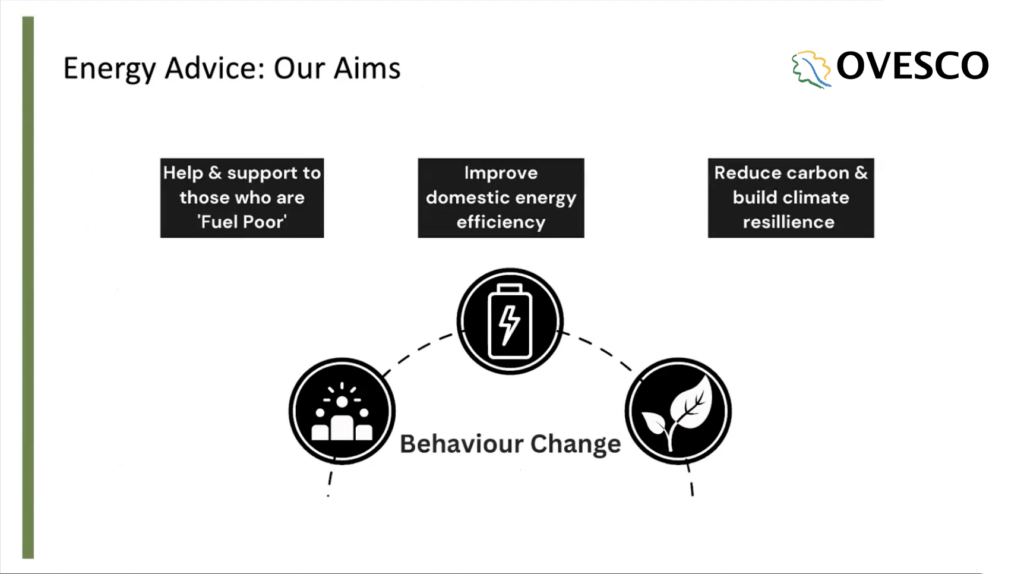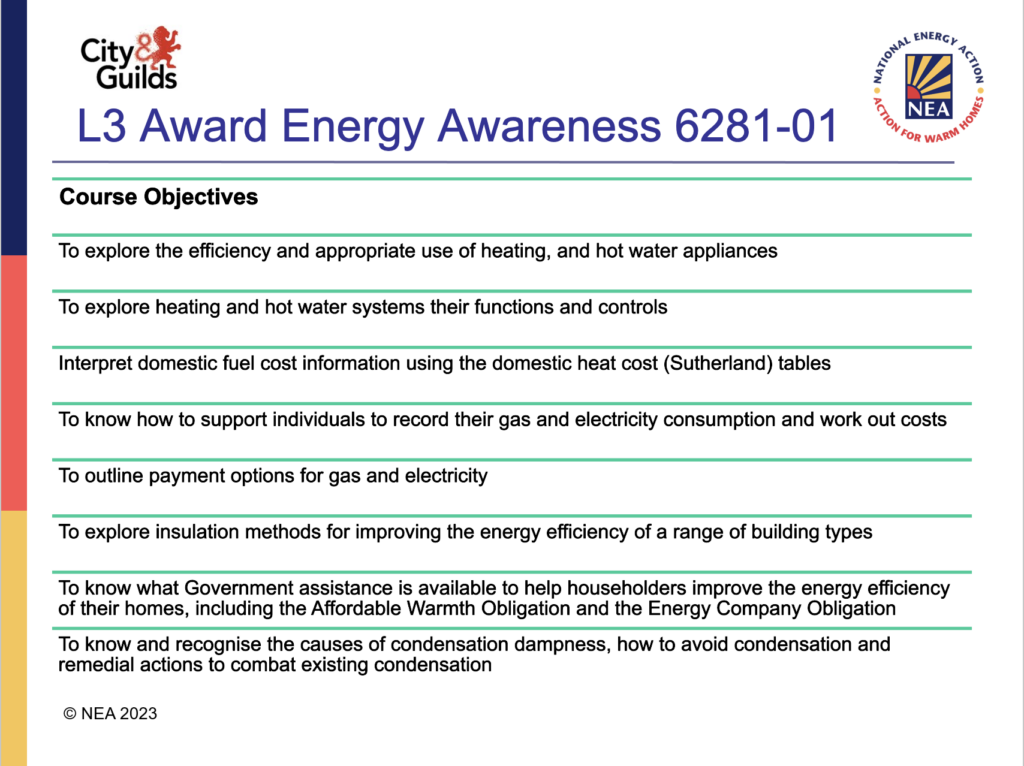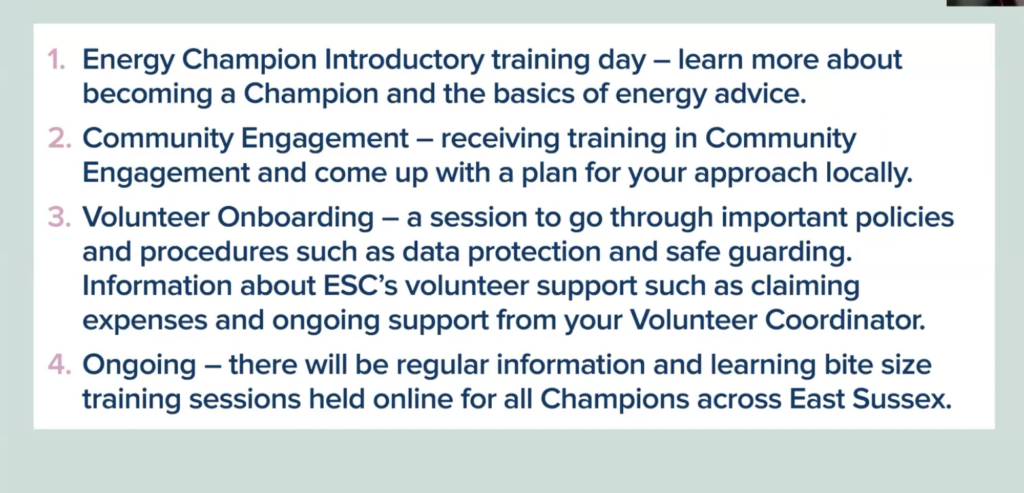Community Energy South has a vision for every neighbourhood, town, village, & parish to have their own energy champion or team of champions to support householders & small businesses to reduce energy use, reduce bills and transition where possible to low carbon generation.
This webinar, held on 22 June with the support of Kent County Council, focused on some of the training available to become an energy champion. And also on learning from established groups in this area on how they work, and are supporting their community to save energy, save money and eco-retrofit their homes.
Kicking off, Claire Walker, Energy Champion Manager, Ovesco gave a whistlestop overview of its activity in the Lewes area. When Claire joined in January 2022, Ovesco had been giving advice for a while, mainly centred around tariffs and switching providers, tapping into funding from Big Energy Saving Network. But it also had limited resources: ad hoc advice essentially, and relied on one part-time volunteer.
Then boom, with utility prices rises kicking in, along with confusing messaging around the £2.5k bill cap from government – with some thinking they couldn’t be charged more than that figure. They were also struggling to reach the vulnerable and elderly post-pandemic, who were still quite tentative about public places. Then, of course, also there were the rising numbers of people in fuel poverty.
Over the past year though, the team has really cemented its energy advice work around three aims – underpinning all of it is behaviour change, from switching off lights to retrofitting your house:
How do they meet these aims? They have five key areas advisors look at. This starts with an energy bill healthcheck, helping with financial queries and reducing energy usage, checking eligibility for support, free energy reducing kits and insulation materials, along with advice on heating upgrades, renewables and retrofitting.
These are all delivered in a variety of different forums, from drop-in surgeries, to foodbanks, a dedicated hotline, plus attendance at local fairs and group such as the Women’s Institute.
From one part-time volunteer, the team is now three paid energy advisors, with the benefit of funding streams including lottery funding, the Big Energy Saving Network and UKPN, plus some small local grants related to the cost-of-living crisis.
Training for Energy Champions
National Energy Action is a charity formed over 40 years ago aiming to end fuel poverty in the UK. Next up, the NEA’s Gill Fox explained how they offer advice, support and lobbies around policy and regulation to protect the vulnerable.
They also offer training to energy champions, the most popular being a City & Guilds qualification in Energy Awareness, to equip frontline workers with the knowledge on what advice to give:
This qualification has been the industry standard for many years, and it has also been taken up by utility companies and local authorities – often used as the minimum qualification their advisors must attain. More than 28 thousand people have completed the course.
There has been more and more take up since the energy crisis hit – Gill stressed the need for us all to work together to ensure the vulnerable are getting all of the advice they need.
As Alex Hartley, South-East London Community Energy (SELCE), pointed out, sadly fuel poverty and climate change are both not going away, so all and everything we can do to help and reduce wastage at the same time are essential.
Energy champions are people who want to help both people and the climate crisis – doing something practical, that doesn’t involve gluing yourself to something. Working in this area, Alex said, “has regalvanised my belief in community.”
Alex co-developed another energy champion training course, which is being provided in East Sussex via Energise Sussex Coast, complementary to the NEA’s, and building upon it:
Funding for Energy Champions
In terms of gaining funding for energy advice, Alex mentioned the Awards for All, a programme run by the National Lottery. Also locally, some councils have money through their public health, climate or regeneration schemes. Also see the Green Funders Network, and Energy Redress funding.
She added that there can be pots of £100k funding for all sorts of things, plus smaller pots for those without charitable status. If you’re a community benefit society , you could also speak to the Hive, run by Coops UK for advice on how to raise more funds. CEE and CEL both have past webinars online that have more information you might also want to investigate, the CEE website lists funding opportunities and often local sources of funding can also be found.
The Future of Energy Advice
What is the future of energy advice? Will it remain community-run, or become a universal, nationwide service?
This was a closing question from Geoff Barnard of Greening Steyning, who have been running a home energy helpdesk for a year and are now in conversation with their district council on where it goes next:
“Listening in today, there are some really heroic and genius efforts going on out there, but I wonder what people think is the future…will it forever be the domain of heroic volunteer groups, or is anybody talking about this getting more systematically delivered – who is thinking about some sort of universal delivery on this?”
Alex added there are moves for a National Energy Advice Network, with the Citizens’ Advice Bureau lining up to run it, and DESNZ looking at how it might operate. She added that community energy groups should have a place at the table, if not be the leading lights in such a plan. CES CEO Ollie Pendered also said he saw no lessening of local groups’ involvement in energy advice in future. And an increasing need and demand for paid coordinators running these projects, alongside volunteers – the value of local, trusted advice is not going away.
Watch the full video of the event




